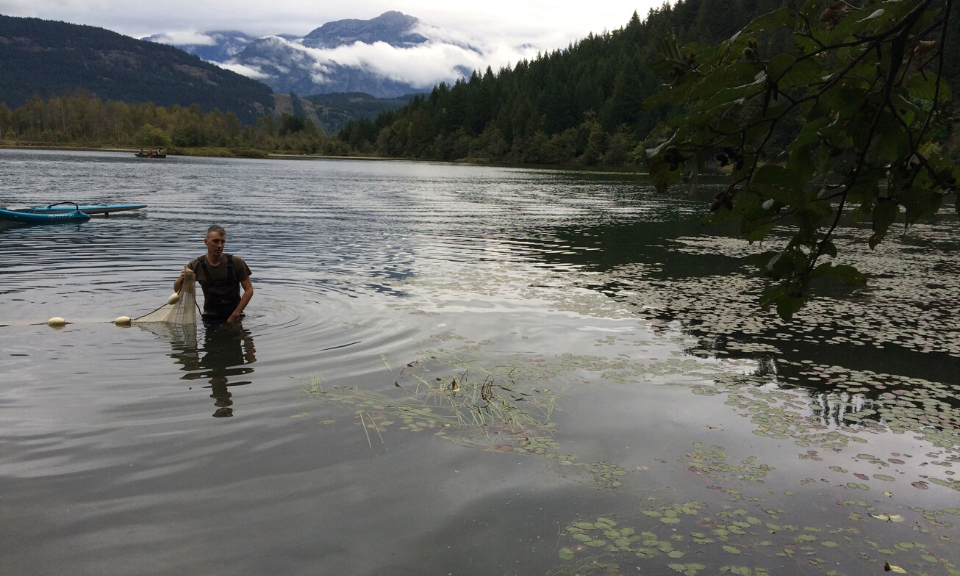Freshwater Fisheries Society of BC’s gift to SFU advances vital fishery research

For many British Columbians, there’s nothing more relaxing than an easy day on the lake with a fishing rod and tacklebox. The science behind keeping fisheries healthy and anglers happy, however, is much more complicated.
Few know this better than the Freshwater Fisheries Society of BC, the non-profit organization with the mandate to enhance and conserve BC’s freshwater fisheries for the benefit of the public. The organization’s Vice-President of Science, Adrian Clarke, says that recreational fisheries have to strike a delicate balance between society and biology—not only enticing anglers, but keeping fish and their surrounding natural environments healthy. What’s more, a billion-dollar industry is at stake when managing fisheries. Canadians spend more than $2.16 billion on recreational fishing—exceeding the value of Canadian commercial fisheries—every year.
“Even with this huge socio-economic boon for Canadians, recreational fisheries lag significantly behind commercial fisheries in terms of targeted research,” Clarke says. Until recently, no Canadian university employed an academic dedicated solely to studying recreational fisheries. Recreational fisheries management in Canada is missing out on the breadth of benefits that directed research effort can provide. Fisheries managers may not be equipped with the most up-to-date knowledge and expertise to make fishing the best it can be.
“We want to make sure people are trained well to have a strong background in recreational fisheries science,” Clarke says. “A focused research position will go a long way.”
A recent gift of $375,000 to SFU from the Freshwater Fisheries Society of BC will fill this gap by enabling the Faculty of Environment to appoint Brett van Poorten as an Assistant Professor. He will specialize in recreational fisheries science and management as a faculty member in the School of Resource and Environmental Management.
Van Poorten is a trained ecologist who has worked for several years in a senior aquatic scientist position with the BC Government as the Unit Head for the Applied Freshwater Ecology Research Unit at the University of British Columbia. He has also developed expertise in management science: the study of how problem-solving and decision-making affects organizations. These combined skillsets provide for an exceptional ability to solve problems faced by fishery managers that goes well beyond fish biology. “After all,” van Poorten says, “managing a fishery is even more complicated than understanding fish.”
“Managers can’t just be biologists,” van Poorten says, mentioning the importance of recognizing behavioural differences between anglers. Some may be more interested in socializing with friends on the dock, while others will never return to a lake if they don’t end the day with a fresh catch for the dinner table. Understanding this diversity and finding ways to satisfy anglers and encouraging them to invest in the fishery, including buying fishing licenses, is important—a huge industry relies on it.
“What we’re really doing is providing a leisure opportunity for people. Their preferences matter. We have to know how people perceive the fishery and why they make the decisions they do,” he says.
Van Poorten began his job in April, and has already begun training the next generation of leaders in Canadian recreational fisheries. He has kick-started a recreational fisheries science and management research group and is supervising PhD students studying the conservation of bull trout in northern BC and the impact of invasive species in Shuswap Lake. The interdisciplinary nature of the Faculty of Environment’s School of Resource and Environmental Management is what first drew him to SFU.
“I’m so fortunate and thankful to be here. It’s exactly where I hoped to be,” he says.
Recalling childhood memories of fishing with his grandfather, and now knowing the excitement on his own children’s faces when they angle a catch of their own, van Poorten knows the value of preserving fisheries goes even deeper than dollars.
“That connection with the outdoors is really vital,” van Poorten says.
Beyond that, he recognizes the importance of fishing as a source of citizen monitoring as well—managers can’t have their eyes on the lakes at all times. “Having anglers out on the landscape to see and report issues, such as pollution, algal blooms or fish die-offs, is vital to closing the management loop,” van Poorten says.
“It’s important for people to connect with nature and important for us to understand where problem spots are.”

